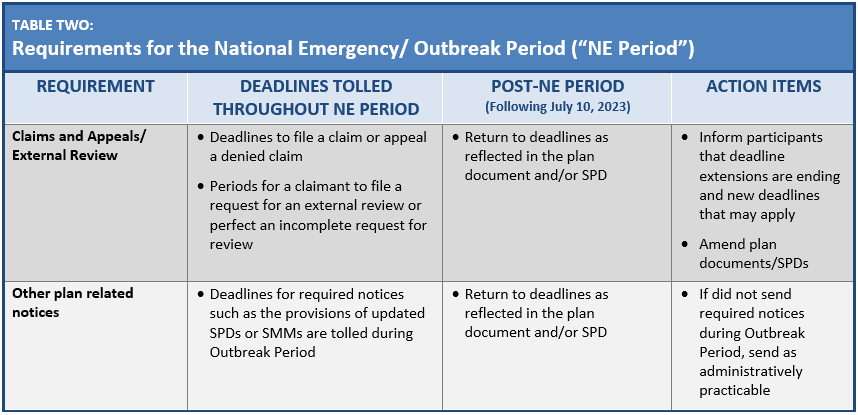Compliance Alert by: The Baldwin Regulatory Compliance Collaborative (BRCC)
The Biden Administration has announced its plan to end the COVID-19 national emergency (NE) and public health emergency (PHE) on May 11, 2023.
Impact to Employers
When the NE and PHE periods end, health plans will no longer be required to cover COVID-19 diagnostic tests and related services without cost sharing. Health plans will still be required to cover recommended preventive services, including COVID-19 immunizations, without cost sharing, but this coverage requirement will be limited to in-network providers.
In addition, once the COVID-19 outbreak period under the NE ends (“Outbreak Period”), health plans can go back to their nonextended deadlines for purposes of HIPAA special enrollment, COBRA continuation coverage, claims and appeals procedures, and certain plan related notices.
Plan sponsors should discuss the upcoming end of the COVID-19 emergencies with their carriers, third-party administrators, and COBRA administrators on required changes to plan documents and processes that will need to be made, as well as to assign related responsibilities.
The remaining sections of this Alert are bifurcated according to whether the underlying requirement arises consistent with the PHE or the NE.
Public Health Emergency
Background
The U.S. Department of Health & Human Services (“HHS”) first declared the Public Health Emergency (“PHE”) on January 31, 2020, due to COVID-19. A PHE declaration lasts for 90 days unless it is terminated early by HHS. At the end of the 90-day period, HHS can extend the PHE or let it expire. HHS has repeatedly extended the COVID-19 PHE since it began in early 2020. Most recently, HHS renewed the PHE on January 11, 2023. HHS has promised to provide at least 60 days’ notice to the public before the PHE’s end date.
On January 30, 2023, the Biden Administration announced its plan to end the PHE on May 11, 2023. The Biden Administration noted that it opposes proposed legislation that would immediately end the COVID-19 emergency periods, stating that this would create chaos and uncertainty for the U.S. health care system.
Impact to Health Plans
The following Table One: Requirements for the Public Health Emergency, reflects the impact of the ending of the PHE on health plan coverage (note that for fully insured plans, changes may need to be postponed until the subsequent plan year depending upon state-level insurance requirements):

National Emergency/ End of the Outbreak Period
Background
Various deadlines related to employer-sponsored group health plans were extended during the COVID-19 Outbreak Period. The Outbreak Period began in March 2020, when former President Donald Trump declared a national emergency (“NE”) due to the COVID-19 pandemic. It continues until 60 days after the end of the NE (or such other date as announced by the federal government).
On January 30, 2023, the Biden Administration announced its plan to end the COVID-19 national emergency on May 11, 2023. Under this timeline, the Outbreak Period will end on July 10, 2023 (60 days from the end of the NE).
Impact to Health Plans
During the NE’s Outbreak Period, many key deadlines for employee benefit plans and participants were extended until (1) one year from the date the deadline would have begun running for the participant; or (2) 60 days subsequent to the end of the NE, if earlier. The following Table Two: Requirements for the National Emergency/Outbreak Period, details the NE-related compliance requirements for plan sponsors and the effect of the termination of the Outbreak Period (following July 10, 2023):


Additional Information
For questions regarding this Alert, please contact a member of your service team.
The Baldwin Regulatory Compliance Collaborative
This Alert was prepared by the Baldwin Regulatory Compliance Collaborative (the “BRCC”), a partnership of compliance professionals offering client support and compliance solutions for the benefit of the Baldwin Risk Partners organization, which includes: Jason Sheffield, BRP National Director of Compliance; Richard Asensio, Burnham Benefits Insurance Services; Nicole L. Fender, the Capital Group; Bill Freeman, AHT Insurance; Stephanie Hall, RBA/TBA; Caitlin Hillenbrand, AHT Insurance; Paul Van Brunt, Baldwin Krystyn Sherman Partners (BKS); and Natashia Wright, Insgroup.


